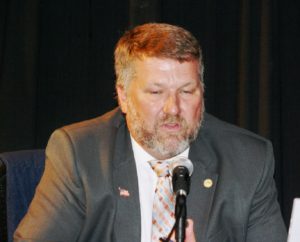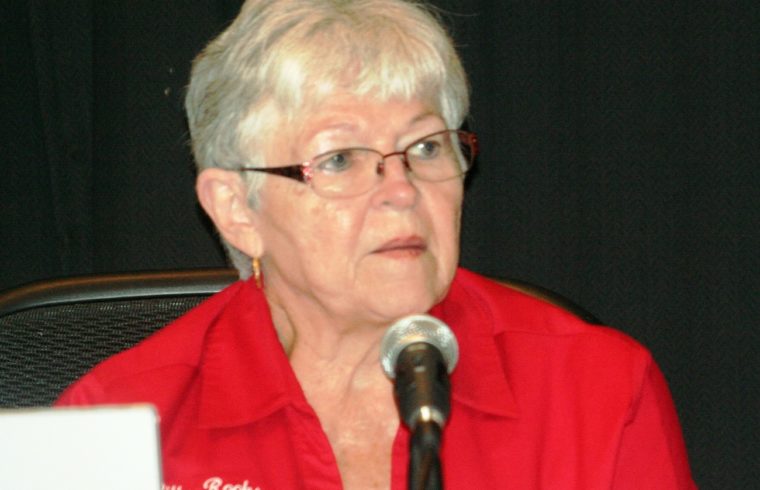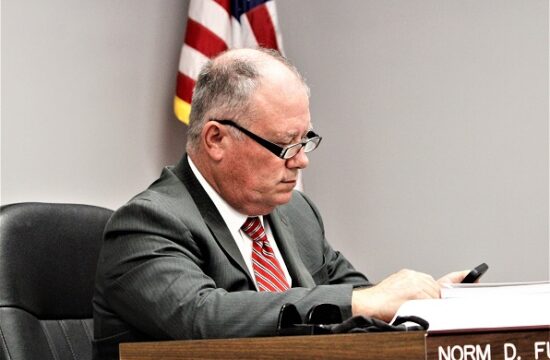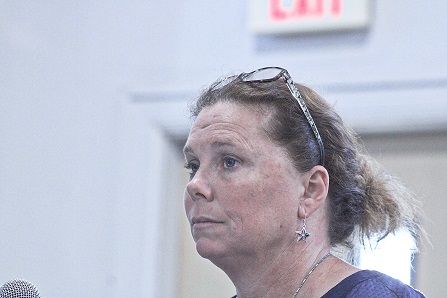Commissioner Lilly Rooks cast the lone vote in opposition to raising the EMS assessment.
By Terry Witt -Spotlight Senior Reporter
After a gut-wrenching public hearing, Levy County Commissioners voted 4-1 Tuesday to approve a $35 annual increase in the Emergency Medical Services special assessment.
The property assessment on a home will rise from $119 to $154 when the new operating year starts on Oct. 1. The assessment will raise $3.6 million in revenue to support seven ambulances, their crews, and administrative staff.
Commercial buildings will be assessed at 10 cents per square foot, industrial buildings 32 cents per square foot, and industrial warehouses 1 cent per square foot.
Commissioner Lilly Rooks staunchly opposed the increase. She cited the ongoing economic problems of the country brought on by the COVID-19 virus and the resulting hardships for local residents.
“I want to remind you we’re in a bad time now. People are struggling, they’re not working. Coming here tonight the side of State Road 24 was lined with people waiting for food, almost down to John’s store. It’s not just here, it’s every community, people are waiting to get food because either they don’t have money coming in or they don’t have a job and to try to put this burden on them, and you have people on a fixed income,” Rooks said. “People are hurting. I know it’s going to be a burden but I cannot see raising taxes in this situation. I just can’t do it.”

Chiefland area resident Renate Cannon cautioned commissioners against raising taxes on those who can least afford to pay the increase.
“The sick need help, not the healthy ones and not those who can afford it. There’s no end in sight,” Cannon said.
Commissioner John Meeks said he hates raising taxes as much as anyone but he said the county was forced by a state mandate to purchase replacement ambulances that could carry heavier loads and which cost the county a considerable amount of money. He said a shortage of EMS paramedics forced the board to raise wages to a more competitive level. He said expenses are rising and the county must keep pace or begin taking ambulances off the road.

He told the story of his own parents who were on a fixed income and how his father was carried by ambulance to a hospital several times in the final year of his life. He said Levy County ambulance crews were extremely professional and caring in the way they handled his father. The last time his father was carried to the hospital in an ambulance his brain was hit by a stroke before he reached the hospital. He passed away.
“In the last hours of his mortal life on this earth, as he knew it, he was handled and taken care of by the very best service in the state. You can chastise me all you want for the taxes but there are times when you have to pay for all the services you receive,” Meeks said.
“In that case, I would indeed rather prefer that services be cut,” Cannon responded. “I lived in Texas without the EMS for a long time. If we had an emergency we took care of it ourselves.”
Spotlight founder Linda Cooper asked the board what they have been doing to tighten county government’s belt in these tough times when the private sector is laying people off. She asked if the county commission had laid anyone off.
“The private sector is suffering. Business employees are being laid off, so my question is what have you done as a group to tighten your belt and make the money go further like the private sector has done. Have you had layoffs, staff cuts, or anything at all? Have you suffered any? People are asking me why so many county employees have take-home vehicles. Have you looked into that – health insurance, maintenance, gas and I don’t know if you have looked into any of this. Have positions been frozen? What has been done to tighten purse strings?” Cooper said.
Cooper said her comments about the general operations of the county and whether commissioners were trying to cut expenses have nothing to do with EMS. She said she will pay EMS special assessment.
She reminded the board of her words three years ago when she opposed the board adopting a $116 special land assessment. She encouraged the board to adopt a fee half that size and then require commercial haulers to pay tipping fees for dumping residential garbage at the landfill. She said the savings could have been used to fund EMS and spare taxpayers the increase in the assessment. She also noted there have been no bids for health insurance in four years.
“That’s my frustration; the $116 should have been cut to $50 and let the commercial haulers of residential garbage pay the tipping fees; then you wouldn’t be raising EMS. You would have the money,” she said.
Commission Chairman Matt Brooks responded that in his first two years on the board the commissioners made tough decisions to save money including requiring its employees to pay for family health insurance coverage instead of the board, which saved millions of dollars. More recently, he said the board adopted a policy requiring employees to pay 15 percent of their individual health insurance coverage instead of the board shouldering the entire cost of the policies. He said it saved money.

“We placed a cap on insurance because we’re tired of seeing the hard-earned dollars of the county go to the health insurance companies,” Brooks said. “This board has set some pretty clear goals in my tenure placing caps, lowering insurance costs, spreading expense amongst all parts of the county including the (gas) tax on travelers coming through here.”
Commissioner Rock Meeks said some departments are short on employees because the board hasn’t filled all the positions.
“That was our approach, as people retired, as people quit, we didn’t fill all those positions to save those dollars,” Meeks said.
County Coordinator Wilbur Dean reminded commissioners that the EMS property assessment hadn’t been increased since 2012. He said the board had built a surplus of funds by using prudent spending practices but he said in the past few years it had become evident that something would have to be done about EMS revenue. The purchase of replacement ambulances and other equipment was one of the primary factors forcing commissioners to raise the EMS assessment.
“I’m sitting here tonight and telling you unless we do something there’s going to be consequences,” Dean said.
Commissioner John Meeks said there was no profiteering on the part of the board. He doubted there would be any money left in the EMS budget when the year ended and if there was any money left it wouldn’t benefit anyone serving on the board. Meeks said the board needed to keep pace with expenses or things could get worse next year.
The board had the option of raising the EMS assessment on a home to $171, $154, or $129. The county’s rate consultants, Nabors, Giblin, and Nickerson recommended $171.
Jared Blanton, the county’s finance director, said the $154 rate for a home would allow EMS to cover all its expenses with $11,000 leftover.
————————-
Board of County Commission Regular Meeting September 8, 2020; Posted September 9, 2020













